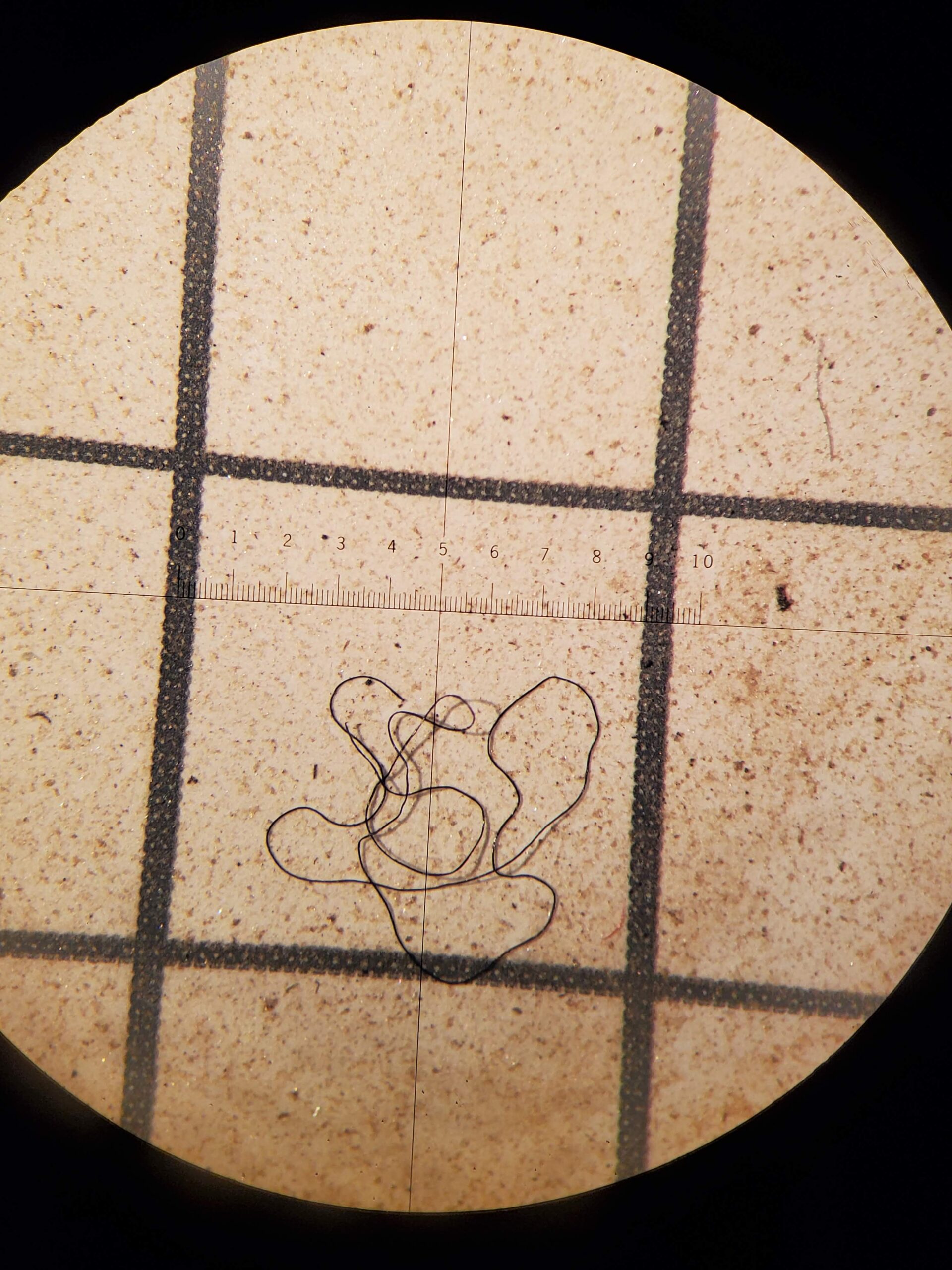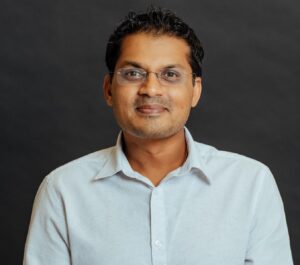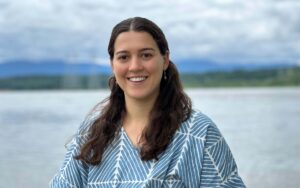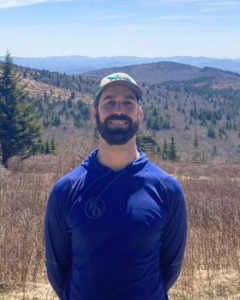The Mid-Atlantic Regional Council on the Ocean (MARCO) Marine Debris Work Group hosted the webinar ‘Microfibers: Current Research, Actions, and Data Gaps’ on Jan. 27, 2025. The webinar provided an overview of current research on the impacts of microfibers on marine resources, assessed key knowledge and data gaps, and identified areas for further investigation. It also showcased ongoing research, mitigation efforts, and explored actionable next steps for advancing research, policy, and collaboration.
Presentation topics and speakers included:
- Public perception on microfibers in the New York Hudson Valley and Long Island regions – Catherine Prunella, water quality extension specialist, New York Sea Grant
- Microplastic Distribution and Hydrodynamic Transport in the Delaware River – Gangadhar Andaluri, assistant professor, Temple University
MARCO Marine Debris Work Group Chair Will Isenberg of the Virginia Coastal Zone Management Program moderated the webinar. See below for speaker bios.
The webinar was the first in a four-part webinar series exploring the impact of microplastics and microfibers on coastal and ocean resources in the Mid-Atlantic region. Leading researchers and policy experts will discuss key concerns, research gaps, and emerging solutions to this growing challenge. These sessions aim to share the latest scientific findings, spark conversations, and identify actionable steps for regional stakeholders.
Visit the Marine Debris Work Group web page for updates on future webinars. Questions about the webinars may be directed events@midatlanticocean.org.

Speaker Bios
Dr. Gangadhar Andaluri
Assistant Professor, Temple University
 Dr. Andaluri currently holds the position of Assistant Professor on a tenure track within the Civil and Environmental Engineering Department at Temple University. He completed his Ph.D. in Engineering at Temple University in 2011, following his attainment of master’s in Chemical Engineering from Villanova University and a B.S. in Chemical Engineering from Osmania University. Before assuming his current role, Dr. Andaluri served in various capacities within the Civil and Environmental Engineering department at Temple University, including non-tenure track faculty member, senior lab manager, and a post-doctoral fellow at the Water and Environmental Technology (WET) Center. His research experiences span a wide array of fields, encompassing water/wastewater treatment, groundwater remediation, surface water monitoring, advanced oxidation technologies, microplastics, antibiotic and antimicrobial resistance, physical/chemical treatment processes, thermal technologies, emerging contaminants, advanced analytical technologies, gas and liquid chromatography, computational quantum chemistry, chemical engineering thermodynamics, chemical sensors, and artificial neural networks. Dr. Andaluri’s current research focus is on the development of treatment technologies for the removal of PFAS from environmental matrices (water, wastewater, surface water, groundwater, and biosolids), development of analytical methods for trace analysis of pharmaceuticals and personal care products, and fate and transport of microplastics and their interactions with other emerging contaminants. Prior to this, Dr. Andaluri has worked on the development of advanced oxidation technologies (Ozone, UV, and ultrasound) for the removal of 1,4-dioxane, volatile organic chemicals (VOCs) and semi-volatile organic chemicals (SVOCs) from contaminated groundwater and recommended treatment schematics for multiple sites. Also, Dr. Andaluri’s work on ultrasound process for the removal of hormones from pharmaceutical manufacturing wastewater has led to a pilot scale implementation of the world’s first ultrasound treatment process for removal of steroid hormones. Dr. Andaluri is deeply committed to advancing knowledge in these areas and has contributed significantly to scholarly discourse through his research endeavors. Furthermore, Dr. Andaluri serves on the editorial board of peer-reviewed journals, peer reviewer for multiple scientific journals, and also as the faculty advisor for the Society of Environmental Engineers and scientists (SEES) student chapter at Temple University, where he plays a pivotal role in mentoring and guiding aspiring environmental engineers and scientists. His multifaceted contributions to academia and mentorship underscore his dedication to fostering excellence in research and education within the realm of environmental engineering and science.
Dr. Andaluri currently holds the position of Assistant Professor on a tenure track within the Civil and Environmental Engineering Department at Temple University. He completed his Ph.D. in Engineering at Temple University in 2011, following his attainment of master’s in Chemical Engineering from Villanova University and a B.S. in Chemical Engineering from Osmania University. Before assuming his current role, Dr. Andaluri served in various capacities within the Civil and Environmental Engineering department at Temple University, including non-tenure track faculty member, senior lab manager, and a post-doctoral fellow at the Water and Environmental Technology (WET) Center. His research experiences span a wide array of fields, encompassing water/wastewater treatment, groundwater remediation, surface water monitoring, advanced oxidation technologies, microplastics, antibiotic and antimicrobial resistance, physical/chemical treatment processes, thermal technologies, emerging contaminants, advanced analytical technologies, gas and liquid chromatography, computational quantum chemistry, chemical engineering thermodynamics, chemical sensors, and artificial neural networks. Dr. Andaluri’s current research focus is on the development of treatment technologies for the removal of PFAS from environmental matrices (water, wastewater, surface water, groundwater, and biosolids), development of analytical methods for trace analysis of pharmaceuticals and personal care products, and fate and transport of microplastics and their interactions with other emerging contaminants. Prior to this, Dr. Andaluri has worked on the development of advanced oxidation technologies (Ozone, UV, and ultrasound) for the removal of 1,4-dioxane, volatile organic chemicals (VOCs) and semi-volatile organic chemicals (SVOCs) from contaminated groundwater and recommended treatment schematics for multiple sites. Also, Dr. Andaluri’s work on ultrasound process for the removal of hormones from pharmaceutical manufacturing wastewater has led to a pilot scale implementation of the world’s first ultrasound treatment process for removal of steroid hormones. Dr. Andaluri is deeply committed to advancing knowledge in these areas and has contributed significantly to scholarly discourse through his research endeavors. Furthermore, Dr. Andaluri serves on the editorial board of peer-reviewed journals, peer reviewer for multiple scientific journals, and also as the faculty advisor for the Society of Environmental Engineers and scientists (SEES) student chapter at Temple University, where he plays a pivotal role in mentoring and guiding aspiring environmental engineers and scientists. His multifaceted contributions to academia and mentorship underscore his dedication to fostering excellence in research and education within the realm of environmental engineering and science.
Catherine Prunella
Water Quality Extension Specialist, New York Sea Grant
 Catherine Prunella is a Water Quality Extension Specialist with New York Sea Grant, where she connects New Yorkers with cutting-edge research on water pollution. She is currently partnering with researchers at Columbia University on innovative technology that filters and removes plastic, including microplastics, from waterways. Catherine previously worked at the National Science Foundation, supporting the funding of impactful education proposals. She received a M.S. in Marine Science from the University of South Florida, where her research focused on Antarctic sediments as records of paleo-climate change. She earned her B.A. in Environmental Studies from the City University of New York – Hunter College.
Catherine Prunella is a Water Quality Extension Specialist with New York Sea Grant, where she connects New Yorkers with cutting-edge research on water pollution. She is currently partnering with researchers at Columbia University on innovative technology that filters and removes plastic, including microplastics, from waterways. Catherine previously worked at the National Science Foundation, supporting the funding of impactful education proposals. She received a M.S. in Marine Science from the University of South Florida, where her research focused on Antarctic sediments as records of paleo-climate change. She earned her B.A. in Environmental Studies from the City University of New York – Hunter College.
Moderator: Will Isenberg
Coastal Planner, Virginia Coastal Zone Management Program
 Will Isenberg is a Coastal Planner in the Virginia Coastal Zone Management Program (Virginia CZM). Will manages various grants and provides coordination support for coastal partners with a focus on coastal resilience topics, ocean resource management, and marine debris initiatives. Will is also the State co-lead of the Mid-Atlantic Marine Debris Work Group, sharing the role with Katie Morgan from NOAA’s Marine Debris Program. Before joining Virginia CZM in 2022, Will spent nine years working in water quality programs at the Virginia Department of Environmental Quality where, among other duties, he worked on watershed clean-up plans called Total Maximum Daily Loads, water quality monitoring and assessment program priorities, coordinating elements of the citizen monitoring program, and the development of a regional Salt Management Strategy for Northern Virginia. He attended Virginia Commonwealth University where he earned both his Bachelor’s of Science in Environmental Studies in 2010 and his Master of Science in Environmental Science in 2012. For his Master’s thesis he built a nutrient mass balance model for the tidal freshwater James River to address questions around nutrient sources and nutrient retention.
Will Isenberg is a Coastal Planner in the Virginia Coastal Zone Management Program (Virginia CZM). Will manages various grants and provides coordination support for coastal partners with a focus on coastal resilience topics, ocean resource management, and marine debris initiatives. Will is also the State co-lead of the Mid-Atlantic Marine Debris Work Group, sharing the role with Katie Morgan from NOAA’s Marine Debris Program. Before joining Virginia CZM in 2022, Will spent nine years working in water quality programs at the Virginia Department of Environmental Quality where, among other duties, he worked on watershed clean-up plans called Total Maximum Daily Loads, water quality monitoring and assessment program priorities, coordinating elements of the citizen monitoring program, and the development of a regional Salt Management Strategy for Northern Virginia. He attended Virginia Commonwealth University where he earned both his Bachelor’s of Science in Environmental Studies in 2010 and his Master of Science in Environmental Science in 2012. For his Master’s thesis he built a nutrient mass balance model for the tidal freshwater James River to address questions around nutrient sources and nutrient retention.
